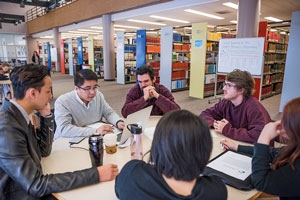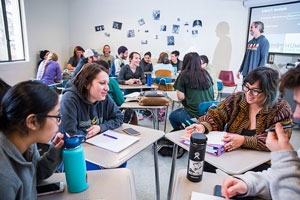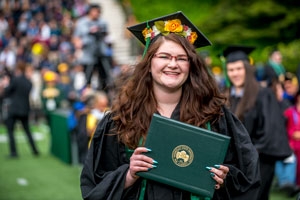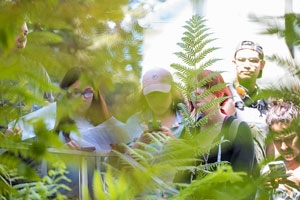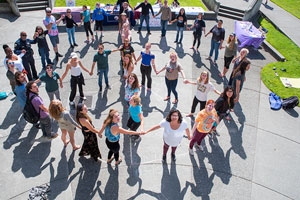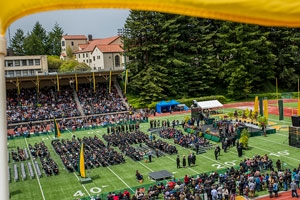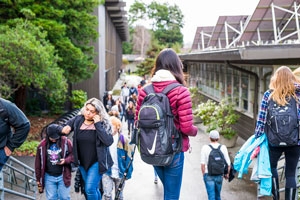New & Special Topic Courses
Fall 2020
ANTH 307: Chinese Cultural Heritage (3 units). The study of Chinese cultural heritage through perspectives on ancient and classical works, including divination and folklore, kinship and ritual, archeological artifacts and literary traditions such as drama and poetry.
ANTH 339: People, Parks & Power (4 units). This course foregrounds Indigenous Peoples’ experiences with environmental conservation. It critically examines conservation’s entanglements with broader processes such as settler colonialism and Indigenous sovereignty, sustainable development, globalization, and cultural change.
ANTH 390: Australian Culture (4 units). Examines changing arguments about sovereignty with focus on Indigenous voices in new media/film. Issues facing Australian Anthropology; land-use, environment, climate, colonial history, culture, politics, representation, health, neo-liberalism & state control.
ART 301: Gender, Power & Hellenistic Art (3 units). Art and architecture survey of the Hellenistic Mediterranean in its historical and cultural context. Major themes: representation of the body, myths, the relationship of politics to art, and archaeological developments.
ART 301: History of Photography (3 units). This online course will trace the history of photography from its invention in the 1830s through its employment in contemporary art. Photographic trends will be discussed.
ART 301: Museums & the Politics of Display (3 units). From cabinets of curiosity to contemporary art fairs, this course will explore the history of exhibition practices and how techniques of display influence our interpretation of objects and cultures.
ART 302: African Encounters (3 units). This course will consider complex histories of encounter between African peoples and the rest of the world, through trade, exploration, and colonization, to African artists in today’s global art landscape.
ART 330: Etching & Screen Print (3 units). Projects will focus on copper plate etching, and screen printing processes including photo-screen print.
ART 372: 4D Video + Animation (3 units). Explore time as a medium in contemporary art through video and animation. This course investigates the ways in which time-based image making have become a key mode of communication for artists and designers today.
ART 395: Art and Place (3 units). Examine the potential of lens-based visual practices to examine the concept of place.
BIOL 685: Bring Your Data: Introduction to R (1 unit). Data integrity, cleanup, manipulation, and visualization are critical for effective science, yet are often neglected. Bring your own data to this hands-on beginner-to-expert tour of R.
BIOL 685: Microbiomes (1 unit). Course will explore how interactions with microbes fundamentally shape all life on earth, and natural phenotypic variation of multicellular organisms (and indeed many single-celled ones).
COMM 480: Health Communication (4 units). Health communication is a continually developing specialty in the field of communication. This course provides a broad introduction to communication as applied to issues of human health and examines how communication functions to facilitate or inhibit the practices of health care in a variety of contexts, such as provider-client communication, provider-provider communication and education, intercultural health communication, alternative medicine, health ethics, health campaigns, mass media health images, and compliance.
CRGS 480: Radical Futures (3 units). This course will examine local and transnational social movements responding to histories and conditions of colonialism, racial capitalism, and globalization as they relate to the environment today.
ENGL 240: Caribbean Literature (4). Focuses on the literature, history, and culture of the English-speaking Caribbean, emphasizing the role of diaspora and oral tradition in the region's literary history.
ENGL 336: Performing Race & Gender (4 units). What are the rewards/ punishments for fitting into or challenging social & legal boxes of race, gender, and sexuality? How can literature subvert the boxes? Discuss Gabby Rivera, Denice Frohman, Deborah Miranda, Franny Choi, Michelle Cliff, Denise Uyehara, Martin Sherman, Tim'm West, etc., and Boots Riley's film Sorry to Bother You. [DCG-d.]
ENGL 350: Black Britain (4). History, theory, literature, and film of the multi-racial “black” culture built by people of African, Caribbean and South Asian descent in the UK, particularly in the period after World War II.
ENGL 370: Palestinian Literature (4 units). Read Palestinian poetry, fiction, memoir, and essay, including U.S. Palestinian writers. Examine themes of home, land, memory, identity, exile, and state violence. Discuss historical, political, and literary contexts, using postcolonial and decolonial feminist frameworks.
ENGL 420/ENGL 620: The Country and the City (4 units). Read postmodern theory, pastoral literary theory, ecocriticism, literary urban studies, theories of literary form, Marxist theory, postcolonial theory, theories of literary history. Read literary texts by global, British and American artists.
ES 336: Performing Race & Gender (4 units). What are the rewards/ punishments for fitting into or challenging social & legal boxes of race, gender, and sexuality? How can literature subvert the boxes? Discuss Gabby Rivera, Denice Frohman, Deborah Miranda, Franny Choi, Michelle Cliff, Denise Uyehara, Martin Sherman, Tim'm West, etc., and Boots Riley's film Sorry to Bother You. [DCG-d.]
ES 480: Campus Dialogue on Race (1 unit). Dynamic speakers, workshops, exhibits and screenings that relate to racial justice, civil rights, democracy, intersectional analysis, and strategies for transformation. CR/NC.
ES 480: Growing Up Chicana/Latino (3 units). Using fiction, nonfiction, poetry and film, this course will explore issues relevant to Chicana/Latino youth in the U.S., including recent unaccompanied Central American migrants, with a focus on activism, identity, gender, citizenship, and culture.
FILM 378: Multi-Camera Studio Production (4 units). Explore storytelling using a multi-camera format. Gain hands-on experience in floor direction, technical direction, camera operation and more. Discover the creative process for episodic narrative, newscasts, game shows and live event coverage.
FILM 465: Contemporary Hollywood Auteurs (4 units). This seminar examines authorship of contemporary film directors that have influenced the development of the Hollywood cinematic narrative, including the distinctive styles of Quentin Tarantino, Spike Lee and Guillermo del Toro.
FREN 390: Perspectives on Marginality in Francophone Films (1 unit). What does it mean to act on the margin, to be on the margin, or to think in terms of marginality? This course will address issues of belonging, normality, and nonconformity in Francophone cinema. [Taught in English.]
GEOG 471 Humboldt Geographic (3 units). Work as part of editorial team in the production of journal featuring department news, feature stories, geographic research articles, alumni updates, maps, and geovisualizations. In addition to fulfilling assigned duties on the editorial team, each student will produce written copy and conduct layout of the journal.
GEOL 380: Hydrogeology (3 units) and GEOL 380L Hydrogeology Lab (1 unit). This course and lab are intended for students who are interested in a deeper understanding of saturated and unsaturated zone flow in porous media. The approach taken in this class is quantitative. Labs and exams will involve a substantial amount of calculation as well as logical, analytical reasoning. [Prerequisites: GEOL 306, and at least the first semester of calculus and physics. Students will need to be competent in the use of spreadsheets (i.e., Microsoft Excel).
GEOL 531: Glacial Geology (3 units). Covers the core principles of glacier formation, flow, the landforms eroded and deposited by flowing ice, as well as using glaciers as climate and paleoclimate indicators (Prerequisites: GEOL 306 and instructor permission.)
GEOL 700: Communicating Science (1 unit). Practice of science communication. Students will learn to communicate effectively beyond their peers to broader, non-science audiences, promoting understanding of its wider relevance to society, and decision-making at all levels (no prerequisites).
HIST 391: American Military Traditions (4 units). American Military Traditions traces the history of the United States military from colonial times through the 21st century. The course will follow American civil military relations including the debate over the nation relying on a standing army or militia for national defense. It will also include the rise of professionalism in the military, technological and tactical developments and the military’s role in a diverse and democratic society.
HIST 392: Drinking & Drunkenness (4 units). This course explores the social, cultural, medical/body, and political histories of drinking from the Renaissance to the twentieth century. Special emphasis is placed on the social history of the alehouse/tavern, the history of the body and drunkenness, drinking and gender, drinking and violence, the caffeine revolution, the gin craze, and temperance/prohibition movements.
HIST 393: Environmental History of Latin America (4 units). Examines how Latin America's peoples have thought about, lived with, utilized, and transformed their environments. Includes explorations of the impacts of colonialism, extractive economies, natural disasters, and the environmental movement.
HIST 397: Hitler & Nazi Propaganda (1 unit). This course places the innovative propaganda of Hitler and the Nazis into its historical context, analyzes its efforts and efficacy, and explores its lasting legacy.
JMC 480: Food, Culture & Storytelling (3 units). Food provides a way to tell stories about people, culture and institutions. In this class, you’ll learn storytelling techniques, the dos and don’ts of describing food, recipe writing, and how to pitch ideas to get paid. You’ll hear from a variety of storytellers such as bloggers, cookbook authors, food historians, food critics, and from the people involved in food production — laborers, farmers, businesses and restaurants.
MATH 480: Putnam Preparation (1 unit). Weekly problem-solving meetings to help students prepare to compete in the prestigious Putnam Exam in Mathematics.
MUS 180: Beginning Music Reading (1 unit). Designed to give the musician a solid foundation in the written language of music in preparation for the rigors of the music theory sequence. By the end of the semester students will be fluent in both pitch and rhythmic notation.
PHIL 485: Civil Disobedience (3 units). Do we sometimes have an obligation to engage in civil disobedience? Must civil disobedience always be non-violent? We will read and discuss two new philosophy books that raise these important issues.
PSYC 680: Assessment and Treatment of Child Abuse (.5 unit). This course meets the requirements of the CA Board of Behavioral Sciences for licensure as a Marriage and Family Therapist. [Open to students enrolled in the psychology MA, counseling program.]
PSYC 680: Introduction to Portfolio (1 unit). This course introduces students to and assist with the planning of their performance portfolio. [Open to students enrolled in the psychology MA, school psychology program.]
PSYC 680: Social Neuroscience (3 units). Overview of the neurobiological mechanisms and evolutionary origins of social behavior, technical research methods, and societal implications of neurophilosophy.
PSYC 680: Suicide Risk Assessment and Intervention (3 units). Training in suicide risk assessment and intervention for mental health counselors.
RS 393: Cults & New Religious Movements (3 units). How do you tell if you or a loved one is a member of a doomsday cult? Why did people join People's Temple, Branch Davidians, or Heaven's Gate? How did Scientology, Jehovah's Witness, and Mormonism grow from small cults into global religions? What are guru-ism, New Age, Neopaganism, and Wicca? Which cults target Humboldt students? What is intentional living? Hasidic Judaism, Pentecostal Christianity, and Shi'a Islam are also introduced. Course will benefit psychology, biology, and anthropology majors.
RS 394: One Nation Under God(s) (1 unit). Students will experience what is meant by American Civil Religion, through events held in conjunction with the Arcata Veterans' Hall. Together with those who serve in the military, public safety, and local governance, explore the nation's creeds, myths, and rituals, and the founding documents that guarantee a diverse population its basic rights.
SW 680: School Based Mental Health Training Seminar (1.5 units). A required component of the school-based mental health stipend program. Focuses on advanced competencies for social work practice in school settings. [Prerequisite: complete foundation coursework and current stipend recipient. CR/NC.]
SED 701: Educational Psychology (2 units). Physical, social, moral, and cognitive development of the adolescent; social and family issues; learning theories, motivation, and assessment.
TA 367: Clowning for Actors (1 unit). A course that explores the unpredictable, ridiculous, and dynamic art of clowning. Students will create clown characters and original material, apply clowning-based principles to their acting, and examine the cultural significance of the clown figure.
WS 336: Performing Race and Gender (4 units). What are the rewards/ punishments for fitting into or challenging social & legal boxes of race, gender, and sexuality? How can literature subvert the boxes? Discuss Gabby Rivera, Denice Frohman, Deborah Miranda, Franny Choi, Michelle Cliff, Denise Uyehara, Martin Sherman, Tim'm West, etc., and Boots Riley's film Sorry to Bother You. [DCG-d.]
Disclosure of Student Information
We take your privacy seriously. Read more about the Family Educational Rights and Privacy Act (FERPA).
